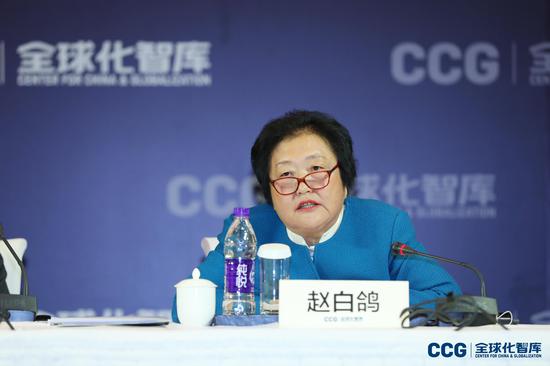
The Fifth Forum on China and Globalization was held in Beijing on April 14, 2019. The Forum was co-sponsored by the Globalization Think Tank (CCG), the China Association for International Economic Cooperation (CAFIEC) of the Ministry of Commerce and the United Nations Representative Office in China (UN China). The theme of the Forum was: Focus on Globalization 4.0 and China's Role in It. Dr. Zhao Baige, Vice Chair of the 12th NPC Foreign Affairs Committee, attended and delivered a speech.
"Belt and Road Initiative" is to adhere to the principle of consultation, co-construction, sharing, Dr. Baige Zhao said, this sharing is not only the interests, including the sharing of knowledge, information and even lessons, many of our lessons are worth considering around the world. Of course, it also includes sharing the future and sharing the value of everyone.
The following is a transcript:
Zhao Baige: Thank you, President Wang Huiyao. I'm very glad to attend this Meeting today. There are many new points of View. Due to the limited time, I shall pick the most important words, and talk about three issues:
First, the current relationship between the new type of globalization and the four industrial revolutions.
Everyone can study this issue, and our think tank has done a study and found that whether it is 4.0 or 3.0, if it is a recognized point of view in the world, it is closely related to the industrial revolution every time. As you can see, the reform of steam engine technology in the first industrial revolution triggered the first globalization, no matter when we calculate it, after the Renaissance of culture, after the steam engine revolution, the introduction of market economy into the world, this is a stage; The second is that the British Empire triggered the second industrial revolution after the electricity power technology revolution, the most typical is the success of marine strategy; The third time is dominated by information technology, and the United States uses a comprehensive approach. It pushed freedom, democracy and market economy to the world, and matched it with the information technology revolution; The fourth is information technology, which I think is the most important, in addition to diversity, more importantly, the fourth industrial revolution produced by the use of intelligence, information and integrated technology. The innovation mentioned by Minister Liu Yanhua just now is particularly important in the fourth industry. Therefore, it is likely to create an important carrier for 4.0. If there is no such technological revolution, I am afraid that if you talk about 1234, its progress will be very difficult.
Secondly, we have four questions to study in this process. Of course, the CCG is now very much in the lead.
First, we should study the relationship between the four divisions of globalization and the four industrial revolutions, and how to implement the convergence of such revolutions. We are now starting to do this work, but we need many experts and scholars to provide us with valuable advice.
Second, we should study who is the main subject of the four revolutions or the four globalization. You may soon think of the British Empire, the United States, so who is that for the fourth industrial revolution? Who is it or who are they? It is a group of decisions, not a country, but a very important group, and the fourth industrial revolution created its technical conditions for such a collective action.
Third, who are the most important participants and stakeholders that we need to address? I have studied the United States carefully, and there is an article On Global Governance and China's Participation, which I think is very good, and we are also studying it carefully.
Fourth, in this process, we have not only made a very clear judgment on the analysis of the past four globalization. Especially for China, not because it is the fourth largest economy, but because it is a country with 20% of the world's population, there is one Chinese out of five individuals, so its opinion is still very important.
Thirdly, there are three issues in the practice and innovation of global governance that we need to consider now:
One is principle or value.
Now there are a lot of controversies concerning the issue. We carefully reviewed and found that, China, as one of the oldest civilized countries with five thousand years, still stands in the forest of the world's nations. And there are many principles and values worthy of our study.The concepts of freedom, equality, democracy, justice and peace and development we are talking about now, have already existed in our ancestors’ mind, which is the concept of harmony.
Second, the mechanism.
As we all know, there is no big problem in the "Belt and Road Initiative", but there are many problems in sharing. Many people think that you actually get the main thing by sharing, and others do not have the opportunity to share.
Third, sharing.
I want to make a statement here, I think the content of sharing is not limited to sharing benefit, but including the sharing of knowledge, information and even lessons. Many of our lessons are worthy of consideration by the whole world. Of course, it also includes sharing the future and sharing the value of everyone, which we call consensus.
RDI International Think Tank has actually been established for five years, having a total of 96 experts and scholars from all over the world its committee members, 319 enterprises which are divided into 15 categories. RDI International Think Tank now is concerned about invisible champions and enterprises that may develop into champions in the fourth industrial revolution. Therefore, I think the practice of RDI International is very worthy of our discussion with the experts and scholars present today. I agree with the view that the program is very important, but action is the only way to achieve the program. Thank you!
Share to Friends
